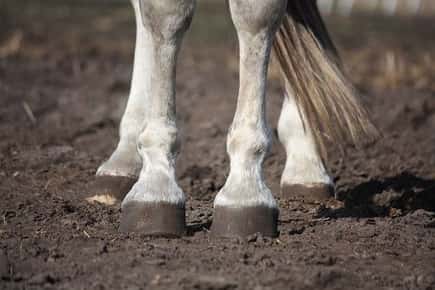
Thrush is a bacterial infection, and one of the most common diseases, affecting horses’ hooves. You will likely know it when you see — and smell — it. The pungent, tar-like black discharge collects in the sulci, or grooves, along the sides of the frog, the triangular structure that covers about 25 percent of the hoof’s bottom.
If thrush is left untreated and progresses into the sensitive tissues, the infection can move into the deeper grooves, causing the frog to deteriorate and resulting in great pain for the horse. In severe cases, lameness is possible if the thrush penetrates the sole and starts to erode vital structures in the foot. Sometimes, portions of the diseased frog will need to be removed by an equine veterinarian or farrier.
Prevention Tips
If thrush is diagnosed early, it is easy to treat and will heal properly. In addition, there are precautions you can take to help prevent the condition, given that it is most commonly associated with poor living conditions. For instance, horses that often stand on damp and dirty surfaces are more prone to developing thrush, because the bacteria that cause the condition thrive in this type of environment.
To help prevent thrush:
- Provide your horse with a clean and dry environment that does not encourage the growth of the organisms that cause thrush. Bedded stalls are preferable; standing on rubber mats is another option for avoiding wet conditions.
- Regularly exercise your horse to ensure consistent and healthy circulation in the hooves.
- Pick the hooves every day and be sure to thoroughly clean out the frog and the sulci. Inspect the hooves for foreign objects, such as rocks or nails, at the same time.
- Adhere to a regular shoeing cycle to prevent the flaps of the frog from growing over the sulci and trapping dirt and moisture.
- Have your farrier examine your horse's hooves and trim the frog if it is overgrown. Removing the infected portions will encourage better air circulation around the frog and expedite the healing process.
If you have any questions about how to prevent thrush or if your horse is exhibiting thrush symptoms, contact our office for help.



